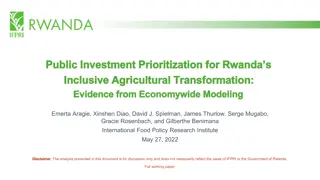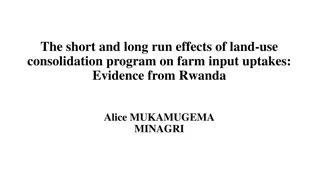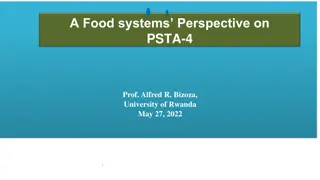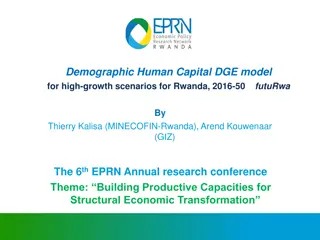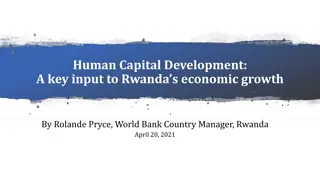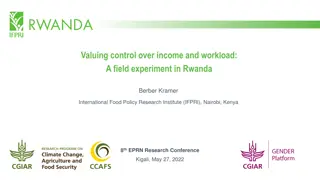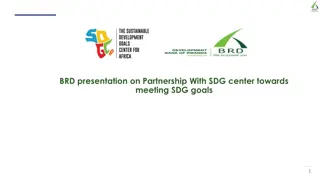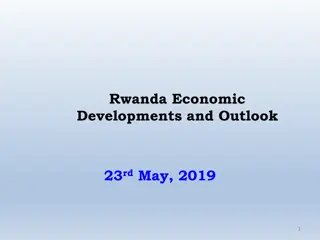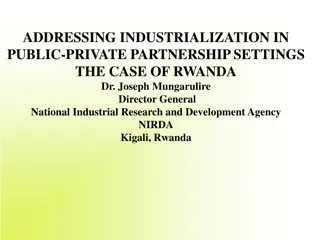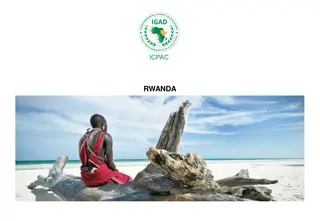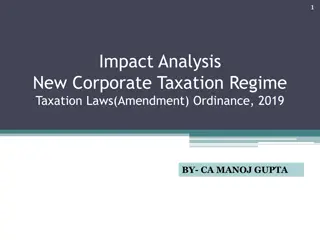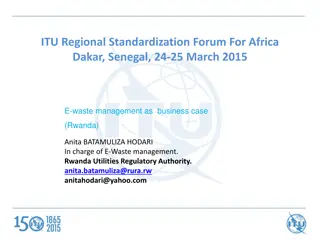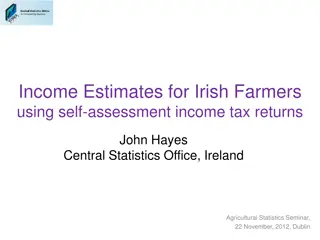Rwanda Income Taxation and Transfer Mispricing Overview
Explore the taxation framework in Rwanda covering taxable presence, computation of business profits, deductable expenses, and base erosion with profit shifting measures. Understand how residents and non-residents are taxed on their incomes and the criteria for taxable presence in the country. Learn about the conditions for deductibility of expenses and the prevention of profit shifting practices.
Download Presentation

Please find below an Image/Link to download the presentation.
The content on the website is provided AS IS for your information and personal use only. It may not be sold, licensed, or shared on other websites without obtaining consent from the author.If you encounter any issues during the download, it is possible that the publisher has removed the file from their server.
You are allowed to download the files provided on this website for personal or commercial use, subject to the condition that they are used lawfully. All files are the property of their respective owners.
The content on the website is provided AS IS for your information and personal use only. It may not be sold, licensed, or shared on other websites without obtaining consent from the author.
E N D
Presentation Transcript
Income Taxation & Transfer Mispricing Outline Taxable presence Taxation of incomes Taxable presence Computation of business profits Base Erosion & Profit Shifting (BEPS) Transfer Pricing Elimination of double taxation Recent updates Expectations
Taxation of Incomes & Taxable presence According to article 4 & 5 of the law no. 016/2018 of 13/04/2018 Rwanda taxes: a) It s residents on their world-wide incomes. b) Non residents are taxed on income sourced in Rwanda. Individuals must fulfill one of the following factors: Having a permanent home in Rwanda, Having an habitual abode in Rwanda Rwandan representing Rwanda abroad. Spend more than 183 days in a 12 months period either continuously or intermittently.
Taxable presence Artificial persons/entities gain taxable presence in Rwanda if: They are established in Rwanda according to laws; There exists the effective place of management any time during a tax period; It is a Rwanda government company. Note: Ministerial order determines the permanent residence and place of effective management Entities can be taxed on income sourced in Rwanda they have a PE (article 6 of law no. 016/2018). PE thresholds (domestic tax law) Service PE : 90 days Construction PE: from day 1 Dependent agents who can conclude contracts on behalf of the principal.
Computation of Business profits Computation of business profits is based on income from all business activities reduced by all business expenses (article 19 of law 016/2018). In general, article 5 provides for specific sources of income taxable in Rwanda as such income from activities performed in Rwanda or activities performed abroad by a resident of Rwanda. Source of income taxable in Rwanda Article 25 & 26 of law 016/2018 of 13/04/2018 set out conditions for deductable and non deductable expense.
Deductable expenses Conditions for deductibility: Incurred for the direct purpose of business and directly chargeable to the income; Correspond to a real expense and can be substantiated by proper documents; Lead to a decrease in the net assets of the business; Incurred for the activities related to the tax period in which they are incurred. Non deductable expenses: Dividends declared and profits paid out to beneficiaries; Reserve allowances, savings and other special-purpose funds; Fines and other similar penalties; Donations except those given to non-profit making organizations not exceeding 1% of turnover; Income tax paid in accordance with Rwanda income tax law or paid abroad and recoverable VAT. Personal consumption expenses Management, technical and royalty fees paid to non-residents exceeding 2% of turnover.
Base Erosion & Profit shifting schemes Trade mis-pricing is the primary means for illicitly shifting funds between developing and advanced countries . Illicit outflows from Africa ranged from $353.5 to $ 242 billion. Source: Global Financial Integrity (GFI) report issued January 2019 and Report of the high level Panel on illicit Financial Flows from Africa. Examples of tax base eroding schemes Transfer/trade mispricing Treaty shopping Business restructuring ( transactions with low/no tax jurisdictions) Artificial avoidance of PE
Transfer Pricing Rwanda introduced transfer pricing rules based on article 33 of law 016/2018. The regime aims to address base erosion and profit shifting. Transfer mispricing happens when related parties: Exchange goods and/or services. Sale, license, exploit intangible assets. Transactions that lack economic substance (transactions with low tax jurisdictions). Cost contribution arrangements. Intra group services (expense deductions). Shareholder expenses/services Excessive interest deduction/Forex losses & interest free loans.
Transfer Pricing TP rules to be gazetted through a Ministerial order, generally provides for the following: Scope (domestic TP, transactions with no economic substance) TP methods (alternative method to CUP/commodity rule) Threshold to keep contemporaneous TP documents (safe habour) TP annex (when to submit) Country by Country reports ( obligation connected with ultimate parent) TP adjustments (failure to comply with arm s length principle) Penalties for failure to keep and produce documents (article 81 draft procedure law). Comparability analysis (No secret comparables, foreign comparable )
Elimination of Double Taxation Transfer pricing adjustment can give rise to double taxation. Rwanda eliminate double taxation by credit method (see article 7 income tax law). The credit allowable cannot exceed the tax payable in Rwanda on the income taxed abroad. Rwanda s treaty network expanded considerably in recent years.
Elimination of Double Taxaton Treaties negotiated and most of them entered into force Country Country Dividends Dividends Interests Interests Royalties Royalties Management Management Professional Professional fees 10% (in force) 10% (in force) 12% (in force) 10% (not in force yet) 10% (in force) 15% (in force) 12% (in force) 10% (ratified) 10% (signed) 10% (Signed) and and fees 10% or 20%1 1 15% 10% 5% 7.5% 7.5% 10% 8% 10% 7.5% South Africa Belgium Mauritius EAC Singapore Barbados Jersey Morocco Turkey2 2 UAE3 3 10% 10% 10% 10% 10% 10% 10% 10% 10% 10% 10% 10% 10% 10% 10% 10% 10% 10% 10% 10%
Elimination of Double Taxation 1: 10 per cent of the gross amount of the dividends if the beneficial owner is a company which holds at least 25 per cent of the capital of the company paying the dividends; or (b) 20 per cent of the gross amount of the dividends in all other cases. 2: The DTA with Turkey has an exception because it provides for 9 months as a Permanent Establishment threshold for Construction and building site. 3: The DTA with UAE has an exception because it exempts dividends, interests and technical service fees (Management fees) when the beneficial owner (the recipient) is the Government.
Elimination of Double Taxation Treaties under Negotiations 1. Federal Republic of Germany 2. The Suiss Federation 3. The Republic of Sao Tome and Principe 4. The state of Qatar 5. The Republic of S. Korea More 7 proposals for negotiations are in pipeline
Recent updates on International taxation 1. Implementation of EOI standards to enhance transparency and exchange of information for tax purposes. a) Rwanda as a member of GF. b) Rwanda a member of OECD development center (Inclusive framework?) c) Multilateral Convention on assistance in Tax matters signing. d) Capacity building in TP & other Int l tax matters e) Law amendments f) Preparation for peer review for Rwanda. TP audits started last year and some have been concluded.
RRAs Expectations Rwanda entities/subsidiaries are expected to: - Prepare and keep TP policy documents on all controlled transactions. - Ensure controlled transactions respect the arm s length principle. - Avoid payments to related parties with no economic substance. - Comply with documentation requirements to avoid penalties. - Voluntary disclosure/TP adjustments by taxpayers can be negotiated. - Disclosure of controlled transactions (on TP annex). - Facilitation of smooth running of audits/advisory visits






